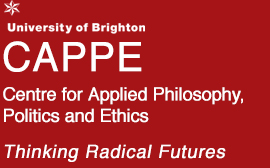1st Mar 2011 6:30pm
G7, Pavilion Parade, University of Brighton

The first NGO campaigns on climate change were launched around 20 years ago, following the October 1988 "Toronto Conference on the Changing Atmosphere" where governments and scientists first sounded the alarm. Two years later, the IPCC released its first report suggesting that 60-80% cuts in CO2 emissions would be needed.
NGO campaigns have largely focused on raising awareness about the problem, providing roadmaps with solutions, and establishing a moral and ethical rationale for addressing what is arguably the most pressing issue of our time. Several questions of morality and ethics feature repeatedly in the discourse:
1) Intergenerational equity: this is embodied in the very definition of 'sustainable development' - development which meets the needs of the present without compromising the ability of future generations to meet their own needs
2) Climate Justice: Supporting vulnerable countries and communities who have done the least to cause the problem, but who will suffer the most
3) Equity: the principle of common but differentiated responsibilities is enshrined in the Rio 1992 agreements, including the UNFCCC: parties should act “on the basis of equality and in accordance with their common but differentiated responsibilities and respective capabilities.”
Yet 20 years on, the science of climate change is still under attack by vested interests, the climate negotiations are going in circles, and significant segments of the population are disengaged. One of the reasons for this may be that the science and policy community, which has been primarily responsible for trying to move this agenda forwards, has paid too little attention to understanding the mechanisms of public perception and discourse, and thus the political consequences of climate communications.
The talk will examind these issues, including some of the underlying factors which motivate public perceptions and action - as voters, as consumers, and as members of families and communities.
Kelly Rigg is the Executive Director of the GCCA, a global alliance of 250 organizations cooperating under the banner of the tcktcktck campaign. She has been leading international campaigns for nearly 30 years on climate, energy, oceans, Antarctica and other issues. She was a senior campaign director for Greenpeace International during 20 years with the organization. After leaving Greenpeace she went on to found the Varda Group consultancy providing campaign and strategic advice to a wide range of NGOs, and led the Deep Sea Conservation Coalition’s campaign to protect the high seas from destructive bottom fishing.